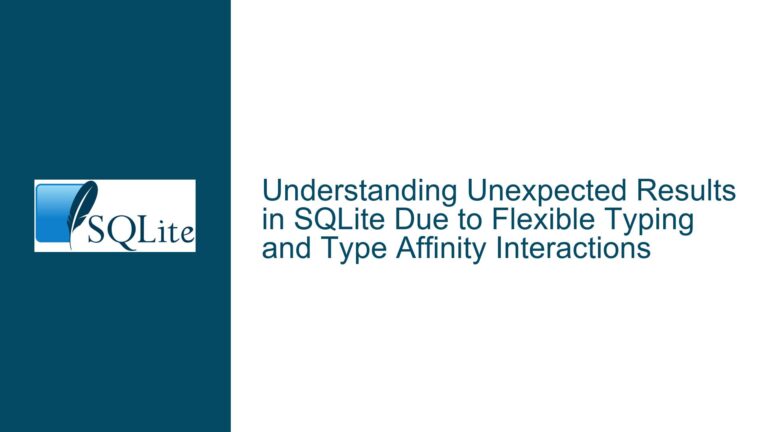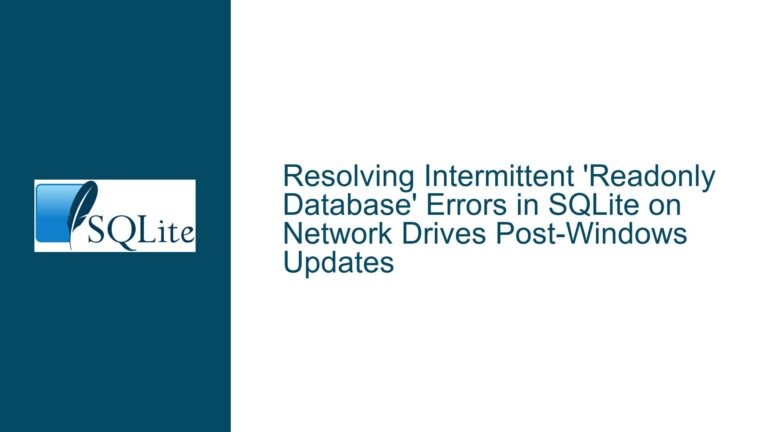SQLite Leading Zero Loss in STRING Column with UTF-16 Binding
Issue Overview: STRING Column Type and UTF-16 Binding Causing Leading Zero Truncation
The core issue revolves around the loss of leading zeros when inserting UTF-16-encoded phone numbers into a SQLite column declared with the STRING type. The user observes that inserting "01012345678" via sqlite3_bind_text16 results in "1012345678" being stored. This truncation occurs despite explicit UTF-16 binding, raising questions about SQLite’s internal encoding conversions and type affinity rules.
Key Observations
- Column Declaration: The column
Info_Telis declared asSTRING, a non-standard SQLite type name that triggers NUMERIC affinity under SQLite’s type affinity rules. This causes SQLite to prioritize numeric conversion when possible. - UTF-16 Binding: The use of
sqlite3_bind_text16inserts a UTF-16 string. However, the NUMERIC affinity of theSTRINGcolumn leads SQLite to interpret the input as a number, stripping leading zeros during storage. - UTF-8 Conversion Attempt: When converting the input to UTF-8 and binding it with
sqlite3_bind_text, an unexpected space is appended (e.g., "01012345678 "). This suggests an error in handling string termination or length parameters.
Technical Context
- Type Affinity: SQLite uses column type names to assign one of five affinities: TEXT, NUMERIC, INTEGER, REAL, or BLOB. The
STRINGtype maps to NUMERIC affinity, which attempts to convert values to integers or floats. If the input resembles a number (e.g., "0123"), it is stored as an integer (123), discarding leading zeros. - UTF-16 vs. UTF-8: SQLite internally converts UTF-16 inputs to UTF-8 for storage unless the database uses a UTF-16 encoding. The
sqlite3_bind_text16function automatically performs this conversion, but type affinity takes precedence over encoding in determining storage behavior.
Possible Causes: NUMERIC Affinity and Encoding Misalignment
1. NUMERIC Affinity Stripping Leading Zeros
- Type Name Mismatch: The declaration
Info_Tel STRINGassigns NUMERIC affinity because "STRING" does not match SQLite’s reserved type names for TEXT affinity (e.g.,TEXT,VARCHAR). NUMERIC affinity converts text that parses as a number into an integer or float. For "01012345678", this results in the integer1012345678. - Implicit Type Conversion: Even when binding text, NUMERIC affinity triggers a "try-to-convert-to-number" step. If the bound text is a numeric string, SQLite converts it to an integer, removing non-significant leading zeros.
2. UTF-16 to UTF-8 Conversion Artifacts
- Encoding Overhead: When using
sqlite3_bind_text16, SQLite converts the UTF-16 string to UTF-8 for storage in a UTF-8 database. This conversion is lossless for ASCII characters (e.g., digits), but the NUMERIC affinity still applies, causing zero truncation. - Incorrect Length Parameter: The user’s UTF-8 binding attempt (
sqlite3_bind_text(..., length=12)) may include the null terminator or miscalculate byte counts. For "01012345678" in UTF-8, the byte length is 11 (1 byte per digit), but specifyinglength=12includes an extra byte, resulting in a trailing space or null character.
3. Schema Design Flaws
- Ambiguous Column Type: Using non-standard type names like
STRINGintroduces unpredictability. A column intended for text storage should use a type name that enforces TEXT affinity (e.g.,TEXT,CHAR). - Data Validation Gaps: Phone numbers often include leading zeros, hyphens, or country codes, making them unsuitable for numeric storage. Storing them in a NUMERIC-affinity column risks data loss.
Troubleshooting Steps, Solutions & Fixes
Step 1: Enforce TEXT Affinity via Column Type
Solution: Modify the column type to a name that triggers TEXT affinity.
Implementation:
ALTER TABLE ABCDE RENAME COLUMN Info_Tel TO Info_Tel_tmp;
ALTER TABLE ABCDE ADD COLUMN Info_Tel TEXT;
UPDATE ABCDE SET Info_Tel = Info_Tel_tmp;
ALTER TABLE ABCDE DROP COLUMN Info_Tel_tmp;
Rationale: Columns declared as TEXT enforce TEXT affinity, preserving input exactly as provided. This prevents SQLite from interpreting phone numbers as numbers.
Alternative: Use a non-reserved type name that still maps to TEXT affinity, such as CHARSTRING or VARCHAR(15):
CREATE TABLE ABCDE (..., Info_Tel CHARSTRING);
Step 2: Validate Binding Parameters and Encoding
Solution: Ensure correct use of sqlite3_bind_text with UTF-8 encoding and proper length.
Code Fix:
// For UTF-16 input (e.g., Windows wchar_t strings)
const wchar_t* phone = L"01012345678";
int byte_length = wcslen(phone) * sizeof(wchar_t); // Length in bytes, excluding null terminator
sqlite3_bind_text16(stmt, param_index, phone, byte_length, SQLITE_TRANSIENT);
// For UTF-8 input
const char* phone_utf8 = "01012345678";
sqlite3_bind_text(stmt, param_index, phone_utf8, strlen(phone_utf8), SQLITE_TRANSIENT);
Key Parameters:
- Length: Use
strlen()for UTF-8 (byte count without null terminator) orwcslen() * sizeof(wchar_t)for UTF-16. - Destructor:
SQLITE_TRANSIENTensures SQLite makes a copy of the string if needed.
Debugging Tips:
- Use
sqlite3_column_type(stmt, column_index)after insertion to verify the stored data type isSQLITE_TEXT. - Retrieve data with
sqlite3_column_text()and compare to the original input.
Step 3: Address Encoding-Specific Edge Cases
Issue: Trailing space when binding UTF-8 with length=12.
Cause: The string "01012345678" has 11 characters. In UTF-8, this requires 11 bytes. Specifying length=12 includes an extra byte, which may be a null terminator or garbage data.
Fix: Use strlen() to compute the exact length:
const char* phone_utf8 = "01012345678";
sqlite3_bind_text(stmt, param_index, phone_utf8, strlen(phone_utf8), SQLITE_TRANSIENT);
Step 4: Schema Validation and Data Integrity
Preventative Measures:
- Use Standard Type Names: Replace
STRINGwithTEXTin schema definitions. - Add Check Constraints: Enforce phone number format:
ALTER TABLE ABCDE ADD CHECK (Info_Tel GLOB '[0-9]*'); - Migration Scripts: Update existing databases to replace NUMERIC-affinity columns with TEXT-affinity equivalents.
Step 5: Advanced Debugging with SQLite Internals
Diagnostic Queries:
-- Check column affinity
SELECT name, type, affinity FROM pragma_table_info('ABCDE');
Expected Output:
name | type | affinity
Info_Tel | TEXT | text
Hexdump Verification:
Use HEX() to inspect stored values:
SELECT HEX(Info_Tel) FROM ABCDE;
For "01012345678" stored as TEXT, the output should be 3031303132333435363738 (hex for UTF-8 "01012345678"). If stored as INTEGER, the hex will represent the number 1012345678 (e.g., 0x3C34FB6E).
Final Solution Summary
- Schema Fix: Change
STRINGtoTEXTor equivalent to enforce TEXT affinity. - Binding Fix: Use correct length parameters and encoding functions.
- Validation: Add checks to ensure data integrity.
By addressing type affinity and binding parameters, the leading zero truncation issue is resolved, ensuring phone numbers are stored as exact text strings.






